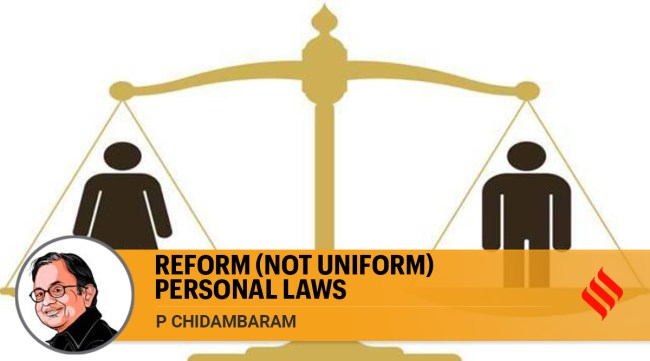Opinion P Chidambaram writes: Reform (not uniform) personal laws
Reform of personal laws is not new. It has been on the national agenda since the making of the Constitution, and was among the top concerns of the first Parliament of India.
 A nuanced approach will be to start a meaningful conversation on the reforms that need to be made in all personal laws, Muslim law included. (File)
A nuanced approach will be to start a meaningful conversation on the reforms that need to be made in all personal laws, Muslim law included. (File) The Constitution of India has a whole chapter on Directive Principles of State Policy pertaining to the welfare of citizens. Article 44 is one among 18 articles of Chapter IV which contains the directive principles. From the point of view of equality and non-discrimination, the directive in Article 38(2) to minimise the inequalities in income and to eliminate inequalities in status, facilities and opportunities is important.
The directive in Article 39 is a central pillar of the chapter from the point of view of social and economic justice. Article 43 directs the State to secure a ‘living wage’ and is the aspiration of millions belonging to the working classes.
Sadly, there is hardly any debate on these directive principles. They are not on the government’s agenda. Article 44 alone has occupied much of the political space, thanks to the agenda of the RSS-BJP and some observations of the Supreme Court.
Words have Meaning
Let’s look at the language of Article 44: “The State shall endeavour to secure for the citizens a uniform civil code throughout the territory of India.” Words have meaning. Unlike Humpty Dumpty’s answer to Alice, a word does not mean ‘what I choose it to mean’. ‘Uniform’ is not ‘common’. ‘Shall endeavour to secure’ is not ‘shall secure’. Babasaheb Ambedkar and his colleagues were not ignoramuses. They had a deep knowledge and understanding of the history, religions, caste differences, social and family systems, cultural practices and customs of the Indian people, and they chose the words of Chapter IV carefully.
Uniform Civil Code (UCC) is shorthand for personal laws. It concerns laws in four areas: Marriage & Divorce, Succession & Inheritance, Minority and Guardianship, and Adoption and Maintenance. Over the centuries, the personal laws of different sections of the people and different geographical areas of the country have evolved in different ways. Who ruled the people played an important part in the evolution. Religion played a crucial part while geography, fertility, conquest, migration, and foreign influences also impacted personal laws.
Reforms started in 1955
As personal laws stand today, there is gender discrimination as well as non-gender based discrimination, some unscientific and unhealthy practices as well as reprehensible practices and customs. Undoubtedly, these aspects of personal laws need to be reformed.
Reform of personal laws is not new. It has been on the national agenda since the making of the Constitution. It was among the top concerns of the first Parliament of India (1952-57). Among the champions of reform were Jawaharlal Nehru and Babasaheb Ambedkar. Four major laws were passed amending and codifying the Hindu Law braving the opposition of orthodox and conservative sections of the people: The Hindu Marriage Act, 1955; Hindu Succession Act, 1956; Hindu Minority and Guardianship Act, 1956; and Hindu Adoptions and Maintenance Act, 1956.
A young nation did a remarkable job of reforming the personal laws of the majority Hindu community. It was revolutionary, but the revolution allowed some aspects to remain. Not all discriminatory provisions were removed; the Hindu Undivided Family, as a legal entity, was acknowledged; and custom and usage in marriage were recognised as exceptions. The last aspect is crucial because most marriages in India are solemnised according to custom.
More amendments were made in 1961, 1962, 1964, 1976, 1978, 1999, 2001 and 2003. Between 2005 and 2008, another set of reforms was made by the United Progressive Alliance (UPA) government. Three of the four Acts (listed above) were amended. The revolutionary change was conferring equal property rights on daughters and sons. New laws, namely, the Protection of Women from Domestic Violence Act, 2005, the Prohibition of Child Marriage Act, 2006 and the Maintenance and Welfare of Parents and Senior Citizens Act, 2007 were passed. Courts stepped in where the legislative bodies hesitated. On August 22, 2017, the Supreme Court struck down the practice of talaq-e-bidat (triple talaq) among Muslims as unconstitutional.
Heed the 21st Law Commission
We paused when we faced the personal laws of the tribal people. None of the four Acts (listed above) apply to the Scheduled Tribes notified under Article 366, clause 25 of the Constitution. The Sixth Schedule of the Constitution was added for the administration of tribal areas in Assam, Meghalaya, Tripura and Mizoram and included a paragraph conferring powers on District Councils and Regional Councils in those states to make laws with respect to inheritance, marriage and divorce, and social customs. Special provisions protecting the religious or social practices and customary law were added for Nagaland (Article 371A), Sikkim (Article 371F) and Mizoram (Article 371G). A demand for similar special provisions has been raised by tribal bodies in Chhattisgarh and Jharkhand.
More reforms in personal laws are certainly necessary. The 21st Law Commission gave sage advice: “This Commission has, therefore, dealt with laws that are discriminatory rather than providing a UCC which is neither necessary nor desirable at this stage… Cultural diversity cannot be compromised to the extent that our urge for uniformity itself becomes a threat to the territorial integrity of the country.”
The Hon’ble Prime Minister has framed the issue in a manner permitting only a binary response — for or against the UCC. This approach treats the people of India as dumb driven sheep. A nuanced approach will be to start a meaningful conversation on the reforms that need to be made in all personal laws, Muslim law included. The key word is reform, not uniform.



